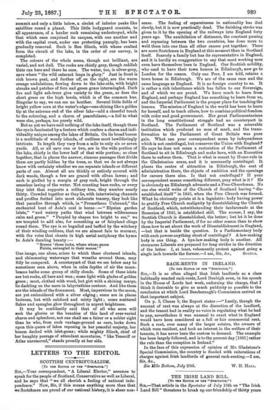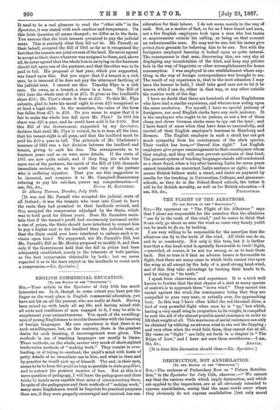THE IRISH LAND BILL. [To SKI Faros or TH• "1:17707-.07."1
Bra, That article in the Spectator of July 16th on "The Irish Land Bill" threatens to break up our friendship of thirty years It used to be a real pleasure to read the "other side" in the Spectator, it was stated with such candour and temperance. On this Irish Question all seems changed ; we differ as to the facts. You assume that the Irish tenants promised to pay the judicial rents. This is precisely what they did not do. Mr. Parnell, on their behalf, accepted the Bill of 1881 as far as it recognised the fact that the tenants are joint owners of the land. He never agreed to accept as their share whatever was assigned to them, and, above all, he never agreed that the whole loss in carrying on the business should fall upon one of the partners, and that the other was to be paid in fall. His proposal of last year, which you supported, was based upon this. But you argue that if a tenant is a rich man, he is immoral if he does not pay the uttermost farthing of the judicial rent. I cannot see this. Timothy Flyn is a rich man. He owns, as a tenant, a share in a farm. The Bill of 1881 fixes the whole rent of it at £75. It gives as the landlord's share £50; Mr. Flyn's share it fixes at £25. To this Mr. Flyn submits, glad to have his moral right to even 225 recognised as at least a legal right. In the meantime, the value of the farm has fallen from £75 to £50. Do you mean to argue that it is fair to make the whole loss fall upon Mr. Flyn? In 1881 his share was 225 a year, and he could have sold it for £400. But this Bill of the Government, supported by my Spectator, declares that until Mr. Flyn is ruined, he is to bear all the loss, that his tenant-right is all gone, and that the landlord must be paid his £50 a year in fulL The principle of Mr. Gladstone's measure of 1881 was a fair division between the landlord and tenant, giving to each his due. The arrangements as to fourteen years and so on were mere details. If the rents of 1881 are now quite unfair, and if they fling the whole loss upon one of the partners, the spirit of the Bill of 1881 demands immediate revision, so as to avert the rain of the partner who is suffering injustice. That you see this suggestion to be immoral, and compare it to Mr. Campbell-Bannerman refusing to pay his cab-fare, passes my comprehension.—I [It was not Mr. Parnell who accepted the judicial rents of all Ireland; it was the tenants who went into Court to have the rents they had promised to their landlords revised, and they accepted the compromise adjudged by the State, which was to hold good for fifteen years. Does Mr. Saunders main- tain that if the tenant's profit had enormously increased under a rise of prices, the State should have interfered to compel him to pay a higher rent to the landlord than the judicial rent, or that the State could ever have interfered to enforce such a re- vision upon him ? We supported, not Mr. Parnell's Bill, but Mr. Parnell's Bill as Mr. Morley proposed to modify it, and then only if the Government held that the fall in prices had been adequately established, purely in the interests of both parties, as the best compromise obtainable by both ; but we never regarded it as in the least unjust in the landlords to resist such a compromise.—En. Spectator.]



































 Previous page
Previous page